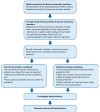Health Literacy Co-Design in a Low Resource Setting: Harnessing Local Wisdom to Inform Interventions across Fishing Villages in Egypt to Improve Health and Equity
- PMID: 33923187
- PMCID: PMC8123197
- DOI: 10.3390/ijerph18094518
Health Literacy Co-Design in a Low Resource Setting: Harnessing Local Wisdom to Inform Interventions across Fishing Villages in Egypt to Improve Health and Equity
Abstract
Fishermen in low resource settings have limited access to health services and may have a range of health literacy-related difficulties that may lead to poor health outcomes. To provide solutions and interventions based on their needs, co-design is considered best practice in such settings. This study aimed to implement a co-design process as a step towards developing health literacy interventions to improve health and equity in the Borollos Lake region of northern Egypt, a low resource setting with a high prevalence of chronic diseases. This study was guided by the Ophelia (Optimising Health Literacy and Access) process, a widely used and flexible co-design process that seeks to create local and fit-for-purpose health literacy solutions through genuine engagement and participation of community members and relevant stakeholders. Following a health literacy survey using the Health Literacy Questionnaire (HLQ), cluster analysis was conducted to identify the diverse health literacy profiles among the fishing communities. Seven health literacy profiles were identified. Vignettes, representing these profiles, were presented and discussed in ideas generation/co-design workshops with fishermen and health workers to develop intervention ideas. Seventeen fishermen, 22 wives of fishermen, and 20 nurses participated in four workshops. Fifteen key strategies across five themes, including 'Enhancing education among fishing communities', 'Provide good quality health services', 'Financial support for health', 'Social support for health', and 'Promote better health-related quality of life among fishermen', were generated. The ideas did not only target the individuals but also required actions from the government, non-government organizations, and fishermen syndicates. By harnessing local wisdom, the Ophelia process has created meaningful engagement with the local communities, leading to a wide range of practical and feasible solutions that match the special needs and environment of a low resource setting.
Keywords: Borollos lake; Ophelia (optimising health literacy and access) process; co-design; fishermen; health inequality; health literacy; health literacy questionnaire (HLQ).
Conflict of interest statement
The authors declare no conflict of interest.
References
-
- Woodhead A.J., Abernethy K.E., Szaboova L., Turner R.A. Health in fishing communities: A global perspective. Fish Fish. 2018;19:839–852. doi: 10.1111/faf.12295. - DOI
Publication types
MeSH terms
LinkOut - more resources
Full Text Sources
Medical


